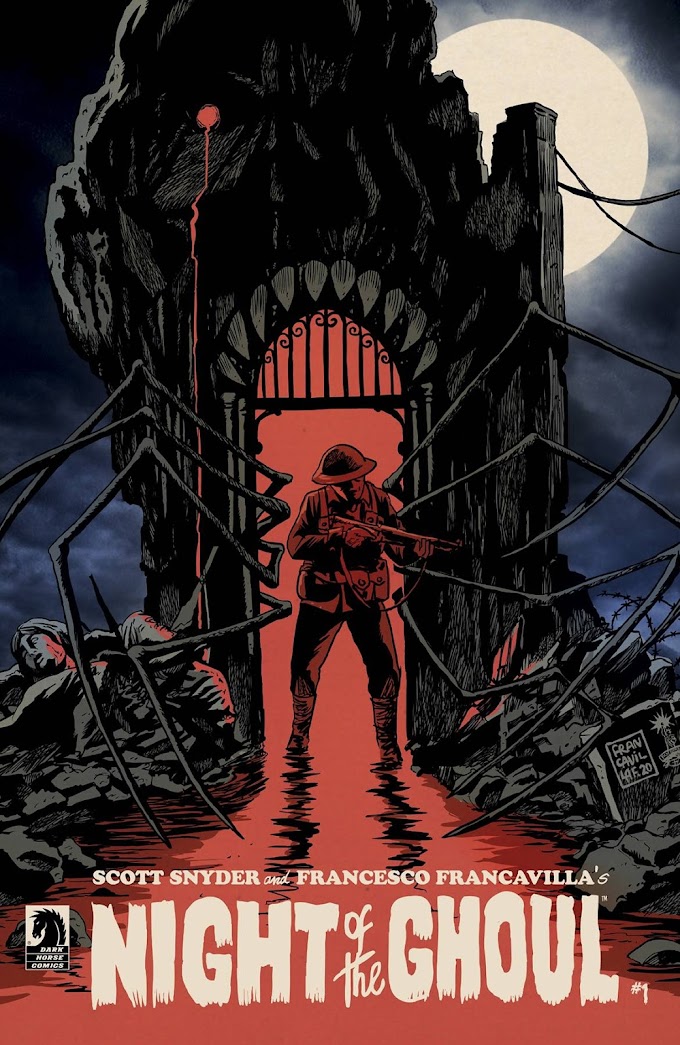 Written by Will Eisner
Written by Will EisnerIllustrated by Will Eisner
DC
More spies, criminals, and evil women cross the Spirit's path in this fourth collection of Will Eisner's superhero comic walks across 1942, a year of war for the United States that slips into the pages of the Spirit over and over again.
It's actually pretty interesting to me how topical Eisner is now that the war has swung into full gear. Free to take on the Axis powers without anyone thinking he's being too political, our blue-garbed hero spends much of this volume going after enemies of the state and even giving the US Government a hotline they can use to contact him.
As a result, the conceit of the Spirit going against the police tends to fall apart here, another idea that Eisner sort of pushes out of the way as the comic proceeds. Denny Colt also seems to be starting to have feelings for Ellen, though they still have a pretty good love-hate relationship going on. His crossings with Silk are more complicated, with the feelings seemingly one-sided.
Silk is by far the best woman in the book, however, which is about the only good thing that can be said about Eisner's women here. His treatment of females in this book, especially in the recurring character of Dolan's sister-in-law, is poor as a whole. She's shown as being a man-killer with five husbands and marriage itself is given a very dismal tone. It's not cute and it's not funny. All the other women we meet are either man crazy (which is true for Silk and Ellen, for that matter) or parts of evil plans. I think he even takes a swipe at the idea of women helping out with the war effort, which is about as wrong-headed as anything else through the first four volumes. I just can't get over my dislike of Eisner's handling of women, and the more I read these collections, the more it bothers me.
This is also true of the racial portrayals. You'll wince whenever the Chinese show up, but he's not much better with Germans or Italians, they just don't look quite as awful. I know there was a war on, so I can understand this in context, but that doesn't make reading it a pleasure.
African Americans are still drawn woefully racist, but I do think Ebony makes out a little bit better here. He's given the chance to do some good work, like using a voice-activated robot to catch spies or serve as backup to the Spirit. His humor lines are based more on that of a funny sidekick than because of his race. It's not progressive by any means, but it is nice to see Ebony getting better parts again, after the regression I saw in the last volume.
Sometimes having a yen to read classic comics (or watch classic movies) can be rough going. They have to have something special to make it worth it. In the case of the Spirit, it's Eisner's drawings and ability to tell a tight story in only a few pages. His spy capers are the best, using every bit of intrigue he can manage. Some of the others that work the best involve Dolan playfully trying to get one-up on the Spirit, but never managing it. And we still have the experimentation with panels and story structure, though there seemed to be a bit less of it this time around.
One story does stand out, not as the best, but as inspiration for the 4th Wall breaking we see regularly now. Eisner is behind on deadline when he's kidnapped and a criminal learns the secrets of the Spirit--by reading Eisner's notes! The Spirit (and a happy coincidence) save the day, but the interplay between character and creator is amazing to see so far back in comics history.
I'm not sure I need to read every Spirit Archive, given that the material is very similar. It's fun to watch the progression as it happens, but any one of these books is a good way to see the development of the comic book from a master. Unfortunately, for a modern reader, they're a bit rough going in places and anyone wishing to try them should be aware of that. Still, if you like crime comics or heroes that use their brains and fists rather than powers to save the day, these are some of the best examples around to see it in its earliest form.
Since it's hard to find these Archives without paying through the nose, I'd recommend this or any of the others to any comics fan. It's interesting--if difficult--reading and will help you see how we got to where we are today in the medium. Eisner, for better or worse, set up some of the ideas we still see in comics today.






![Sweat and Soap [Ase to Sekken] by Kintetsu Yamada](https://blogger.googleusercontent.com/img/b/R29vZ2xl/AVvXsEgMnQltxjWqGS1_duhCp9Er1a0NbALuSFrqvjaV4_PjN_w67xCGghYt-l0qKyqTH7Ei7gbq_mxVq8aPAuOiyaArwAMLJWhpGmOYaARUBnwvjmv2-ZIe20m_zR5CvKnPdI6US_AuOnmi3gSX/w680/57525895-BA7E-4EF8-9FE4-89F9C164E1A4.jpeg)
